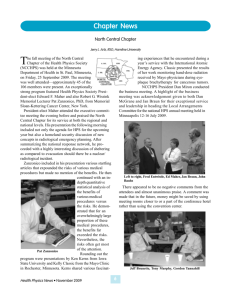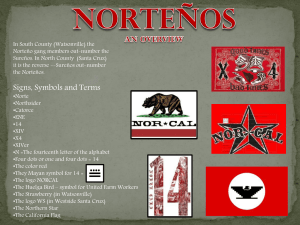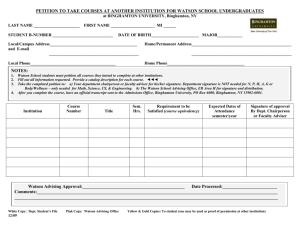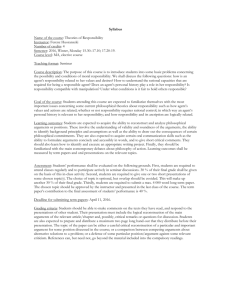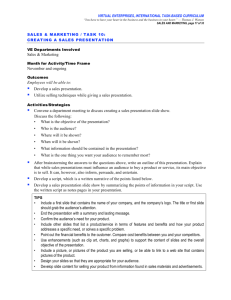CRI389Y0 – Rights, Freedoms and Responsibilities in Criminal Law
advertisement
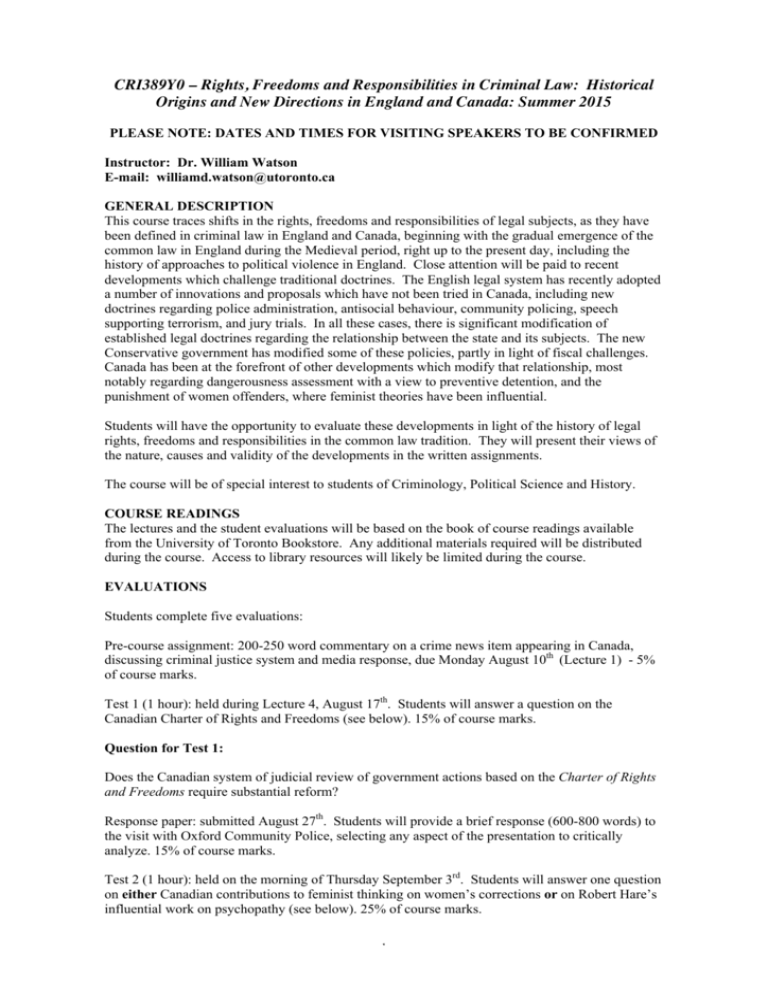
CRI389Y0 – Rights, Freedoms and Responsibilities in Criminal Law: Historical Origins and New Directions in England and Canada: Summer 2015 PLEASE NOTE: DATES AND TIMES FOR VISITING SPEAKERS TO BE CONFIRMED Instructor: Dr. William Watson E-mail: williamd.watson@utoronto.ca GENERAL DESCRIPTION This course traces shifts in the rights, freedoms and responsibilities of legal subjects, as they have been defined in criminal law in England and Canada, beginning with the gradual emergence of the common law in England during the Medieval period, right up to the present day, including the history of approaches to political violence in England. Close attention will be paid to recent developments which challenge traditional doctrines. The English legal system has recently adopted a number of innovations and proposals which have not been tried in Canada, including new doctrines regarding police administration, antisocial behaviour, community policing, speech supporting terrorism, and jury trials. In all these cases, there is significant modification of established legal doctrines regarding the relationship between the state and its subjects. The new Conservative government has modified some of these policies, partly in light of fiscal challenges. Canada has been at the forefront of other developments which modify that relationship, most notably regarding dangerousness assessment with a view to preventive detention, and the punishment of women offenders, where feminist theories have been influential. Students will have the opportunity to evaluate these developments in light of the history of legal rights, freedoms and responsibilities in the common law tradition. They will present their views of the nature, causes and validity of the developments in the written assignments. The course will be of special interest to students of Criminology, Political Science and History. COURSE READINGS The lectures and the student evaluations will be based on the book of course readings available from the University of Toronto Bookstore. Any additional materials required will be distributed during the course. Access to library resources will likely be limited during the course. EVALUATIONS Students complete five evaluations: Pre-course assignment: 200-250 word commentary on a crime news item appearing in Canada, discussing criminal justice system and media response, due Monday August 10th (Lecture 1) - 5% of course marks. Test 1 (1 hour): held during Lecture 4, August 17th. Students will answer a question on the Canadian Charter of Rights and Freedoms (see below). 15% of course marks. Question for Test 1: Does the Canadian system of judicial review of government actions based on the Charter of Rights and Freedoms require substantial reform? Response paper: submitted August 27th. Students will provide a brief response (600-800 words) to the visit with Oxford Community Police, selecting any aspect of the presentation to critically analyze. 15% of course marks. Test 2 (1 hour): held on the morning of Thursday September 3rd. Students will answer one question on either Canadian contributions to feminist thinking on women’s corrections or on Robert Hare’s influential work on psychopathy (see below). 25% of course marks. 1 Questions for Test 2: Topic 1: Feminist criminology of women’s corrections. Has the contribution of Canadian feminist research on women’s corrections enhanced correctional services for women? Topic 2: Psychopathy. Has contemporary research on psychopathy based on Robert Hare’ Psychopthy Checklist – Revised (PCL-R) improved our criminal justice system? Short term paper: submitted with Test 2. Students will complete a 1,250-1500 word paper on one of the topics covered in Lectures 4-10. There will be some flexibility to allow students to write about another topic that interests them which can be related to the material in these lectures. All students will meet by appointment with Professor Watson during his office hours held on Monday August 17th and Wednesday 19th to discuss their choice of essay topic. They will have the opportunity to discuss the progress of their paper during the office hours held after this. 40% of course marks. TIMETABLE Week 1: Monday August 10th – Sunday August 16th Monday August 10th: Lecture 1: Introduction to the course. Origins of English law – emergence of the Feudal state and the formalization of custom: violent punishments and fines. Mens Rea. Emergence of the jury. Outlawry. Common law. Development of statute. The Crown. Regulation and the colonial state. Calvin’s case. Penitentiaries. 11:00: Academic Orientation 2:00-3:00: Professor Watson – office hours 3:00: Oxford walk Tuesday August 11th: Lecture 2: Pre-confederation criminal law and policy in British North America Canada. Confederation and the Criminal Code. Differences from English tradition. Influence of US. Federal Code vs provincial justice. Emergence of Supreme Court of Canada. 2:00-3:30: Professor Watson – office hours Wednesday August 12th: Lecture 3: Rights and freedoms: origins of common law rights and freedoms tradition. Hobbes and Locke. Influence of US. Charter of Rights and Freedoms. United Kingdom and European Court. 12:00-1:00: Professor Watson – office hours Gym orientation Thursday August 13th: Visit 1: A visit to London to major criminal law and related landmarks: the Foundling Museum, the British Museum ‘Enlightenment’ gallery; the Tower of London. Evening a ‘Jack the Ripper’ walk. Friday August 14th Free Saturday August 15th Free Sunday August 16th Free. 2:00 pm-3:30 pm: Professor Watson – office hours 2 Week 2: Monday August 17th – Sunday August 23rd Monday August 17th: Test 1. Lecture 4: Policing the community: origins of modern police force in England. Early history of Canadian policing. Development of ‘asymmetrical federalism’ in Canada’s patchwork of policing arrangements. Independence of police forces. Community policing models. Police Community Support Officers. Police Commissioners. 2:00-5:30: Professor Watson – appointments to discuss term paper. Tuesday August 18th: Morning: Lecture with Professor Roberts from the Centre of Criminology, Oxford, at Worcester College. 2:00 - 4:30: Lecture 5: Public order law: alcohol regulation; decarceration and drunkenness; influence of Europe on UK alcohol regulation; Antisocial Behaviour Orders/Criminal Behaviour Orders. 5:30 - 8:30: Professor Watson – appointments to discuss term paper. Wednesday August 19th: Test 1 returned. Lecture 6: Security and secrecy: History of media censorship in UK. British Official Secrets Act. October crisis. Impact of Northern Ireland conflict. Canada’s reaction to 9/11. Proposals to ban certain kinds of speech re: terrorism in the UK. Afternoon: Visit from Oxford police officers. 5:00 - 8:00: Professor Watson – appointments to discuss term paper. Thursday August 20th: Visit 2: A return visit to London to sites of major historic political violence: Smithfield Market (Peasant’s Revolt 1381); Newgate and Old Bailey (Gordon Riots 1780); Sidney Street, Stepney (Siege of Sidney Street 1911); Liverpool Street and St Ethelberga’s Church (IRA bombing 1993); Aldgate (‘7/7’ bombings 2005). Friday August 21st Free Saturday August 22nd Free Sunday August 23rd Free. 2:00-3:30: Professor Watson – office hours Week 3: Monday August 24th – Sunday August 30th Monday August 24th: Visit from Professor Julian Roberts, Worcester College 2:00 - 4:00: Lecture 7: Homicide Law and the Death Penalty: Infanticide; diminished responsibility (hospital orders); ‘life’; current UK proposals aimed at restricting discretion. 5:00 - 6:30: Professor Watson – office hours. Tuesday August 25th: Visit 3: Nottingham Trent University and The Galleries of Justice Museum. Wednesday August 26th: Lecture 8: Two traditions re: the jury: Influence of US in Canada. Summing up. Jury selection. Recent restrictions on availability. Deference to jury verdicts in Canada. Wrongful convictions: traditional doctrines – Lord Denning. Impact of IRA convictions in UK. Impact of US cases in Canada and UK. Compensation in UK. 3 Afternoon: Visit from Sian Lockley, Senior police officer 5:00 - 6:30: Professor Watson – office hours. Thursday August 27th:: Lecture 9: History of criminological theory – development of UK schools Bentham to the present. Influence of UK and US criminology in Canada. Current schools of criminological theory in UK and Canada. Role of criminological theory in current administrations – especially the UK (‘New Realism’ and after). 2:00-3:30: Professor Watson – office hours. 5:00 pm Response paper due. Friday August 28th Free Saturday August 29th Free Sunday August 30th Free. 2:00-3:30: Professor Watson – office hours Week 4: Monday August 31st – Sunday September 6th Monday August 31st : Response Paper returned. Lecture 10: Feminist criminology and women’s corrections. History of women’s corrections. Holloway Prison. P4W. Closure of P4W. Canada at forefront of contemporary innovations – influence of feminist criminology on women’s corrections in Canada and influence of Canada on English speaking world. 2:00-3:30: Professor Watson – office hours. Tuesday September 1st: Lecture 11: Psychopathy and dangerousness assessment: English medical history and legal innovation. Canadians involved in treatment without changes in law. Therapeutic nihilism affects UK and Canada. Canadian Robert Hare and the new science and treatment of psychopathy. Development of dangerousness assessment instruments and Dangerous Offender legislation. 2:00-3:30: Professor Watson – office hours. Wednesday September 2nd: Study period for Test 2 with Professor Watson (optional). 2:00-3:30: Professor Watson – office hours. Thursday September 3rd: 10:00-12:00: Term paper due. Test 2. Course ends Evening: Formal Dinner at Worcester College Friday September 4th / Saturday September 5th Free Sunday September 6th Return to Toronto 4

